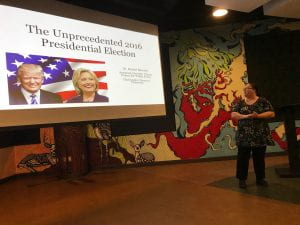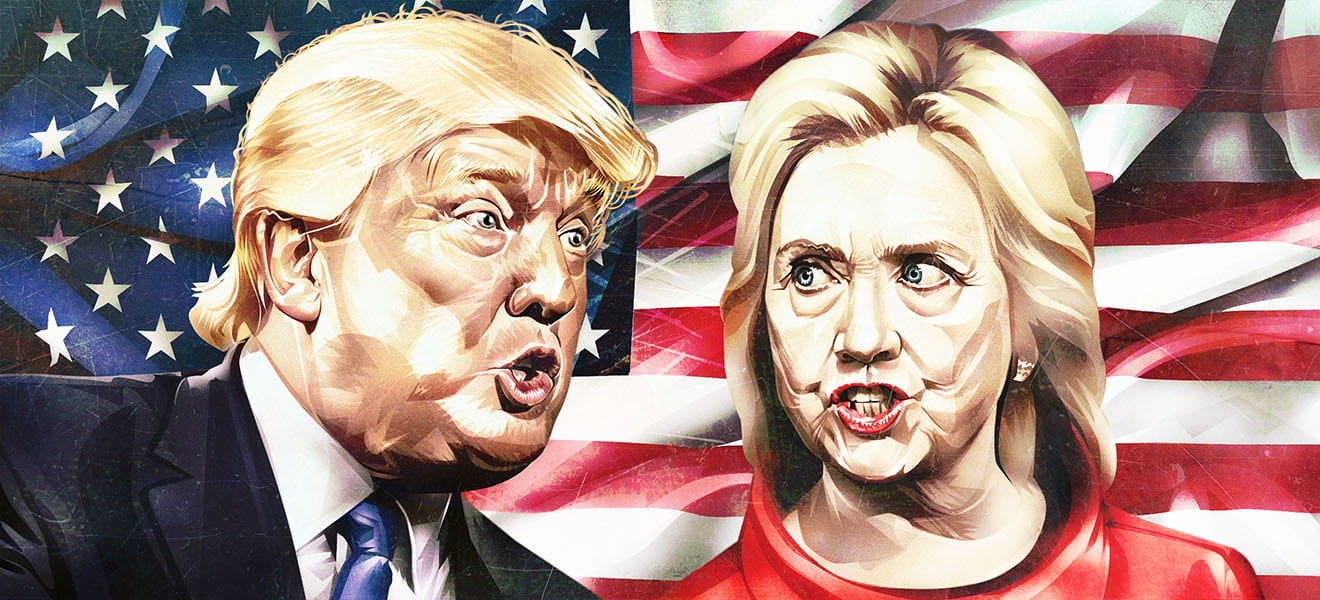
On Thursday, November 9, one year after the 2016 presidential election, the UAB Institute for Human Rights co-sponsored the event, “The Unprecedented 2016 Presidential Election,” at the Edge of Chaos located in UAB’s Lister Hill Library. Other sponsors of the event were UAB’s Department of Government and the Edge of Chaos.
The event featured special guest, Dr. Rachel Bitecofer, the Assistant Director of the Wason Center for Public Policy, a professor at Christopher Newport University, and an academic pollster. The event was on her new book, which has the same title: The Unprecedented 2016 Presidential Election.
Large amounts of data are presented in Bitecofer’s book. She states it “brings an empirical, political science approach that answers the question of why Hillary Clinton lost the 2016 presidential election, and it focuses on the strategical elements that campaigns are going through because the public is not really aware of what they see in campaign politics.”

Bitecofer began by announcing that her approach to looking at the election results is holistic and systematic, and argues that the entire campaign was framed by an electoral strategy, meaning that there were two problems the candidates faced: reaching out to moderates and independents to vote one way rather than the other and then to get the partisan voters to show up. “If they show up, they’re a guaranteed voted,” Bitecofer said, “but that is a big if.”
The lecture was broken down into chapters. The first was titled: “Pitchforks and Torches.” This was when Bitecofer “put the 2016 election into context,” and looked at the patterns that put Donald Trump in the White House. She examined patriarchal behaviors that were prevalent in the 1950s and 60s that still persist today. She examined the effect of the media’s influence and how the US entered an era of polarization; the media has opened “partisan vacuums,” which are areas where it is possible to only get news from a partisan source like Breitbart or HuffPost.
In the next chapter of the lecture, “Making of the Media Event,” Bitecofer showed how Trump dominated the media until snagging the GOP nomination. Bitecofer’s research was presented with graphs that showed how Trump’s popularity in the news peaked when he did things like “picking a fight with the Pope on Twitter,” or “saying he wanted to ban all Muslims from the country.” Bitecofer then showed that even while Hillary Clinton and Bernie Sanders were battling it out for the Democrat Nomination, the news continued to focus more on Donald Trump. She said that this came from Donald Trump’s knowledge of “how to capitalize on both his celebrity and the media’s thirst for scandal.” The Trump campaign ran a base-centered campaign. They appealed to the base voters, a voter who votes for the party rather than the candidate, rather than the establishment.
Bitecofer debunked the myth that “if the Clinton campaign had done ‘x, y, or z’ they would have been more successful,” by saying that, using the metrics one usually does to measure campaign success, they ran an almost perfect campaign. The Clinton campaigned out-fundraised the Trump campaign and the Clinton campaigned got the SuperPACs, which is unusual for a Democrat’s campaign. Despite the almost perfect campaign, there were mistakes. The Clinton campaign made the mistake of hiding the fact that Hillary had pneumonia, and during the debate when she was sick, she made the claim about “deplorables.” Bitecofer said this was a mistake as Clinton has always had so much control over her emotions and demeanor that this came as a shock to many people because “she let that control down.”
Continuing the observation of the media, Bitecofer presented the evidence of news sources’ endorsements of Hillary Clinton. All but two major news sources endorsed Clinton, which was unlike any election in history. Usually, according to Bitecofer, there are sources that only endorse Democrats, and some that only endorse Republicans. Some who never endorsed a Democrat before endorsed Clinton. Not only was this strange but, “not even sitting Republicans endorsed Donald Trump until after the Iowa caucus. No one in the party wanted him,” Bitecofer asserted.
Third-party voting, referred to as “defecting” in presidential elections, was a large issue in this election; defection rates were higher than any in modern history – higher than the 2000 elections. “In Wisconsin, for example, a state that Clinton lost by 1%, the defection rate for third party candidates is normally about 1.5%. [It was] 6.32% in 2016,” Bitecofer found. “The problem is that all of the defectors who wrote in Bernie Sanders’ name or voted for Jill Stein because they just could not bear to vote for Hillary Clinton, cost her the election. I am not saying it is their fault, but I am saying that the campaign that they ran did nothing to prevent it.” She also found that defection only mattered in Hillary versus Bernie. There was almost no defection from Republicans to a third-party candidate. “Democrats fall in love; Republicans fall in line.”
Bitecofer then told of an experiment that she conducted. She went to the adamant Bernie supporters and asked, “What if instead of Tim Kaine, Hillary Clinton brought on Elizabeth Warren as her Vice President candidate? Would you have voted for her then?” This tactic suggested Hillary empowered the more progressive Democrats and attempted to bring in those who were in the #BernieorBust movement. About half of them said it would have made them more likely to vote for Clinton. From this experiment, Bitecofer concluded that had the Clinton campaign ran a base-focused campaign like the Republicans had, “we would likely have the first female president sitting in office now.”
Ultimately, it was concluded that “Clinton ran the perfect strategy for the wrong electoral campaign in an extremely polarized era. In such an era, it is all about firing up your base; you better give them candidates that get them ‘up’!”
The UAB Institute for Human Rights is proud to have such knowledgeable lecturers for our events and programs. For a list of our upcoming events, please visit our events page.

